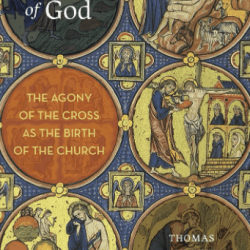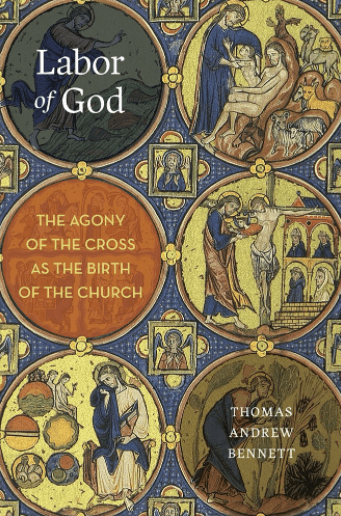 The title for this post comes from the line in the hymn that has this before it: “And on that Cross, where Jesus died.” We’ve got rhythm and we’ve got rhyme, but do we have NT theology? Back in the 1950s and 1960s C.H. Dodd and L.L. Morris locked horns on this one: Dodd said the term meant “expiate” (as in expiate or remove sins) while Morris said the term meant “propitiate” (as in Jesus’ death resolving and pacifying the wrath of God against sin and sinners). John Stott, in The Cross of Christ, weighed in on this one and sided with Morris, and it has become standard evangelical theology to contend for a propitiatory atonement (penal substitution is a slightly larger, though connected, theological category). Most encounter this evangelical theology in gospel preaching in which the problem is sinners under God’s wrath with the solution being the death of Jesus that resolves that wrath. I have addressed some of this in A Community called Atonement.
The title for this post comes from the line in the hymn that has this before it: “And on that Cross, where Jesus died.” We’ve got rhythm and we’ve got rhyme, but do we have NT theology? Back in the 1950s and 1960s C.H. Dodd and L.L. Morris locked horns on this one: Dodd said the term meant “expiate” (as in expiate or remove sins) while Morris said the term meant “propitiate” (as in Jesus’ death resolving and pacifying the wrath of God against sin and sinners). John Stott, in The Cross of Christ, weighed in on this one and sided with Morris, and it has become standard evangelical theology to contend for a propitiatory atonement (penal substitution is a slightly larger, though connected, theological category). Most encounter this evangelical theology in gospel preaching in which the problem is sinners under God’s wrath with the solution being the death of Jesus that resolves that wrath. I have addressed some of this in A Community called Atonement.
Do you see propitiation at the core of the atonement? Do you think God’s wrath was pacified (propitiated) in the cross?
Not all agree with the propitiation proponents, and one who did not agree was C.F.D. Moule. Recently Robert Morgan and Patrick Moule, nephew to that great NT scholar, Charlie (C.F.D.) Moule, published some previously unpublished writings of Professor Moule and the title is Christ Alive and At Large. I read everything Moule writes if I can. Once I heard a young enthusiast explain Grammcord to Charlie Moule by describing a grammatical problem that could be chased down through a computer search, and then the enthusiast said there five instances of the grammar in the NT — to which Professor Moule responded: “Six if you count Codex Bezae.” The enthusiast knew what a computer could pop out; Moule knew the textual tradition alongside it that wasn’t in the computer. Then I heard Moule say something that I shall never forget: “Why, the Greek Testament isn’t so long one can’t put it to memory!” (Why use a computer if you have it all put to heart? was the implication.)
Back to propitiation. Moule in his characteristic succinct way summarizes the NT texts, and I quote them below after the jump.
1. The word “propitiation” means to propitiate God and his wrath; that sense is found in the OT but “in the NT it is almost extinguished” due to the “startingly original thought of the NT” (113).
2. In the NT “God is not spoken of as the recipient of what is referred to” … that is, nowhere in the NT, when the recipient of this action of these words is mentioned, is God the one who receives the action. For the word to mean “propitiate” or to “appease God” God must be the recipient; nowhere in the NT, when the word is used, is God the recipient.
3. Whenever the initiator, or subject, of the action is used in the NT, God is that initiator. That is, God does this act. He points to Romans 3:25 and 1 John 4:10.
4. If the acted upon is sin, then the term does not mean “propitiate” but “expiate.”
Thus, Moule: “If, then, God is the subject or originator, not the object or recipient, of hilas-procedures, it is manifestly inappropriate to translate them as propitiatory; one is driven to use a word such as ‘expiatory’, which has as its object not propitiating a wrathful God but removing a barrier” (114). The theme of NT atonement then is 2 Cor 5:19: God was reconciling the world to himself. God doesn’t need to be propitiated, Moule observes; God is the one doing the reconciling.
5. He sees an exception in language at Eph 5:2: “…walk in the way of love, just as Christ loved us and gave himself up for us as a fragrant offering and sacrifice to God.” This is propitiation language from the OT, but a hilas– word is not used here. He doesn’t think 1 John 2 is about advocating before an alienated God.
Overall then he finds the “centrifugal force of the Christian gospel spinning an OT concept to the circumference, if not beyond” (114). Reconciliation exacts a price… forgiveness and repentance. In Christ, both God and man, he observes, “that price is paid, absolutely and finally” (114). “Nowhere in the NT is it said that the wrath of God was satisfied by the death of Jesus” (114).
Now the texts:
1. Hilaskomai:
Luke 18:13 “But the tax collector stood at a distance. He would not even look up to heaven, but beat his breast and said, ‘God, have mercy on me, a sinner.’
Heb 2:17 For this reason he had to be made like them, a fully human in every way, in order that he might become a merciful and faithful high priest in service to God, and that he might make atonement for the sins of the people.”
2. Hilasmos:
1 John 2:2 He is the atoning sacrifice for our sins, and not only for ours but also for the sins of the whole world.
1 John 4:10 This is love: not that we loved God, but that he loved us and sent his Son as an atoning sacrifice for our sins.
3. Hilasterion:
Rom 3:25 God presented Christ as a sacrifice of atonement, a through the shedding of his blood—to be received by faith. He did this to demonstrate his righteousness, because in his forbearance he had left the sins committed beforehand unpunished—
Heb 9:5 Above the ark were the cherubim of the Glory, overshadowing the atonement cover. But we cannot discuss these things in detail now.










